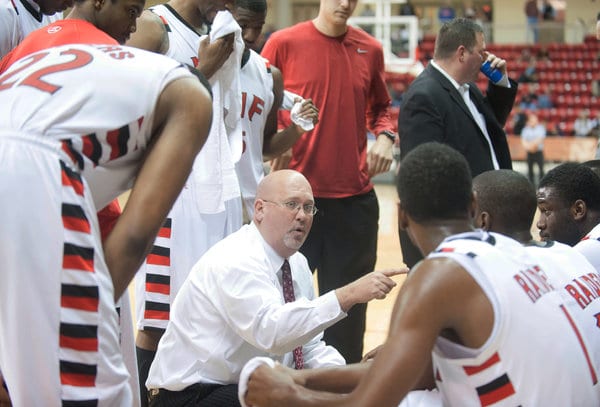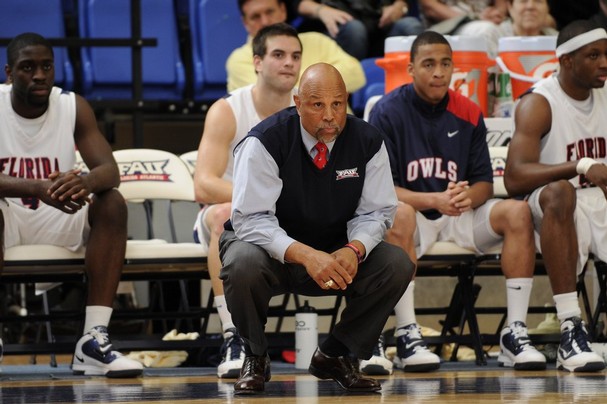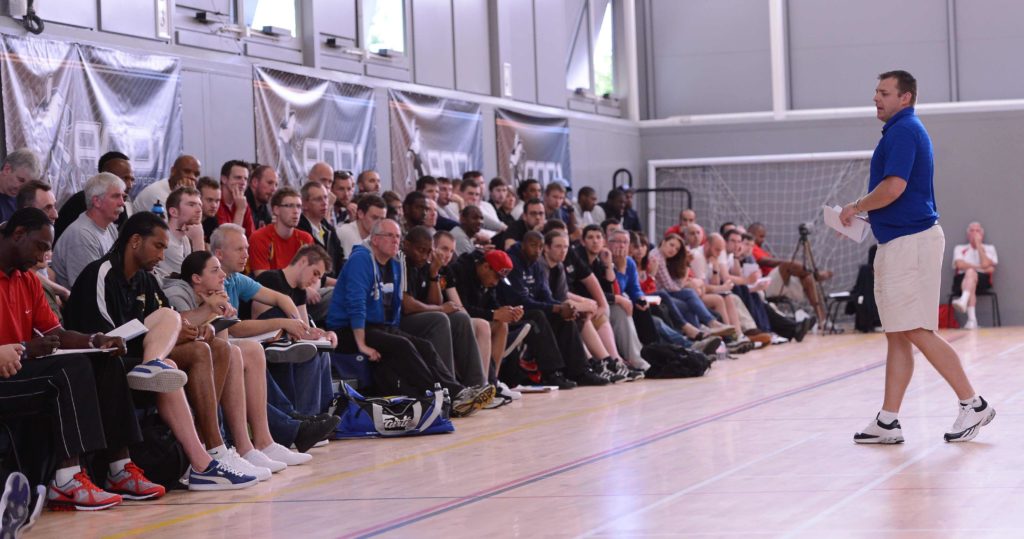
Have you ever wanted to get in the mind of a great basketball coach and pick his brain about different areas of the game? Well, this is what these basketball coaching clinic notes are designed to do. These clinic notes have been taken from different basketball coaching clinics from around the country. They will allow you to learn from other coaches’ experiences and give you a head start on your basketball coaching career.
The Importance of Basketball Coaching Clinic Notes
As a basketball coach, there are several different ways to learn. One of the ways is learning from personal experiences. You can learn through trial and error and figure out what works and what doesn’t. This type of learning usually takes longer and can be quite painful at times. At some level, you are always going to have to learn like this.
However, there is another way to help ease the process and point you in the right direction, and that is learning from other basketball coaches that have already been there. That is what is so good about being able to go to coaching clinics to listen to other outstanding coaches talk about their experiences.
It is not always easy, though, to dedicate a weekend to go to a coaching clinic, so the next best thing is being able to watch a video of the clinic or get the notes from it. That way, you can learn and grow as a basketball coach on your own schedule when you have free time.
You will still have to figure out what your basketball coaching philosophy will be and the different strategies you are going to use for your team, but you will at least be able to see what has worked well for other coaches and what hasn’t. This will, hopefully, speed up your learning curve and help get you thinking and growing as a coach.
Must-Read Basketball Coaching Clinic Notes
Paul Fortier Rising Coaches Basketball Coaching Clinic Notes
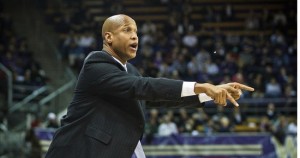
Paul Fortier is an assistant men’s basketball coach at the University of Washington, and he is in his 8th year of the program (12-13). His role with the team is Director of Player Personnel and also Player Development. Paul is also an ex-player for the Huskies, so he understands things from a player’s perspective. Coach Fortier has proven himself a great Player Development coach working with players in their program like Spencer Hawes and Quincy Pondexter, who are now in the NBA. Here are the basketball coaching clinic notes from when he spoke at the Rising Coaches Conference in 2010.
- A lot of people don’t know how hard you’re going to have to work.
- To advance, you have to be willing to relocate.
- Work for a coach who you believe in.
- It’s crucial to work for a good person.
- Never make promises you can’t 100% keep.
- Situations change a lot and often.
- People will check up on you and notice you when you don’t know it.
- Seek out opportunities to better yourself.
- If things don’t work out, stay focused, and stay the course.
- Take the initiative and do more.
- Don’t be scared to push the envelope.
- Don’t just be a “Yes” guy.
- Make sure you are always on point and complete your tasks.
- Do your job in the best possible way.
- Who is the “button guy” for recruiting?
Bob Cantu Rising Coaches Basketball Coaching Clinic Notes
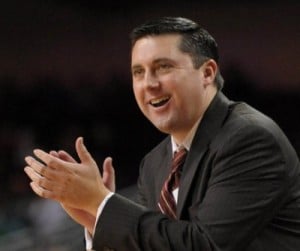
Bob Cantu was currently promoted to interim men’s basketball head coach at the University of Southern California. He is in his 12th season with USC (12-13) and has been in college basketball for 17 years. Coach Cantu has been a part of 4 different coaching regimes while at Southern California and has acquired a lot of coaching knowledge during that time. Here are some basketball coaching clinic notes that were taken while he spoke at the Rising Coaches Conference in 2010.
Every day you interact with people, it’s like an interview.
- The only thing you can control is your own personal work ethic.
- Make a name for yourself on your own staff!
- Outwork everyone.
- Sell yourself daily with your work ethic.
- Find an area/niche and be great at it.
- Take ownership and pride in everything- big and small.
- Are you a “task guy” or a “responsibility guy”?
- Be a “responsibility guy.”
- You interview for your next job every day you are alive.
Start your own network.
- Expand your network.
- Write down 5 Assistant coaches & 3 Head Coaches, and work with those guys.
- After hour messages (short and simple, no need for a return call from them).
What can you do to make the program better?
- What do you bring to the table? (VERY IMPORTANT!).
Prepare to give the Head Coach information you think he needs, especially if you are trying to be retained on a staff that has left.
- “You gotta last.”: What do you have to do to stay in the business?
If you have to say “if” about a recruit, don’t sign him.
- i.e., If he played harder, he would be a high major talent.
It’s better to listen than to speak.
Be organized, be efficient.
- Take notes and make an agenda for each day.
- Budget your time and make things a priority.
Try to have everything run through you.
- i.e., camp brochures, equipment supplies, travel, etc.
- Become irreplaceable!
If you want something bad enough, don’t let anyone tell you that you can’t.
Evaluate talent with your eyes, not your ears.
Be loyal – ALL THE TIME.
During recruiting, try to stand at the baseline, so the kid sees you and sit across from his bench to see interactions with coaches and refs when he is not in the game.
Ask a recruit who he is going to have help with the decision-making process.
- Get information constantly.
- Remember that a “key person” can change in the recruiting world.
“Who you know” will get you a job, but “what you know” will help you keep it.
Get to know your own players!!
- Invest time with them, interact with them, and earn their trust.
- We must get to know our players better!
- Utilize pre and post practices (it’s essential!).
Be patient… doors will open and close over time for you.
Josh Pastner Rising Coaches Basketball Coaching Clinic Notes
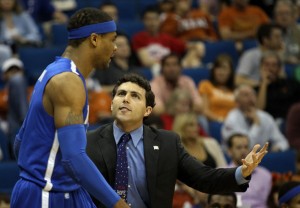
Josh Pastner is the head men’s basketball coach for Memphis University. He is currently in his 4th season as the head coach (12-13). In his first 3 years as the Tigers head coach, he won a remarkable 75 games, which is really impressive, especially for a new coach. Josh continues to make his argument for being one of the best young college basketball coaches in America. These basketball coaching clinic notes were taken from the Rising Coaches Conference in 2010.
We are coaches. We have the ability to impact lives.
- We have an opportunity, don’t take it for granted.
- Enjoy the journey, enjoy the process.
- Life flies by; it goes by fast.
- Recognize that we need to embrace the journey.
You have responsibilities to a lot of people when you are a coach.
GRATEFULNESS!
You have to be in the right place at the right time.
- But work hard, so you have the opportunity to catch a break.
Know your limitations.
- Your (assistant coaches and support staff) strengths should be your HC’s weakness(es).
The best power you can have is calmness and a clear mindset.
- You need to have clarity in every decision you make.
- Think of the long-term.
Players win games.
- Teach them to win and put them in positions to be successful.
- Get guys to play hard!
- Start out being tough on them and gradually back up if needed.
- Much better than doing the opposite.
Be a disciplined individual.
Have documentation of everything you do.
- It serves as a way to protect yourself.
- It also serves as a way to reflect on things.
If you are ever a HC, fight to have your own compliance personnel.
- It will save you headaches in the long-run, and it protects you.
Recruiting:
- Keep it simple with recruits.
- Have a little shake & bake, but keep it simple and be direct.
- Get straight to the point with recruits.
- Get to the source.
- Find out who is helping make the decision.
- An underrated person involved: HS Coach.
- He gets to see the kid daily for 9 months of the year.
- Always be selling the program to recruits.
Jim Fox Rising Coaches Basketball Coaching Clinic Notes

Jim Fox is a part of the Davidson College men’s basketball coaching staff. He is the associate head coach and is going into his 12th season (2012-2013) with the Wildcats. Coach Fox has helped Davidson achieve many team goals, one of which is making Davidson into a household name. In this time there they have been to 7 post-season tournaments. Here are the basketball coaching clinic notes from when he spoke at the 2010 Rising Coaches Clinic.
You need to want to be a Head Coach.
- Is your HC preparing you to be a HC yourself?
- You need to wear different hats to have a well-rounded perspective and have a well-rounded set of abilities.
Be loyal- it’s the most important thing.
- Don’t have one foot in the door and one foot out of it.
- This is a cut-throat business, but we don’t have to be.
Be trustworthy.
- If you make a mistake, own up to it and learn.
Be competent – know your stuff & get better at it.
- Always be learning from peers and other programs.
- Players will see right through you if you are not competent.
- Seek out opportunities to get better.
- Gather information constantly.
Be reliable, be detailed.
- Be organized!
- Sloppiness is a disease.
HC’s want Finishers.
- Follow up and be a finisher.
- We are in a results-based business.
Misc.
- It’s not about who you know- it’s about who knows you!
- Be respectful- you don’t know it all.
- “Conversation is your personal advertisement.”
- The relationships you develop will set you apart.
- Prepare yourself a day before for all your calls, texts, and emails.
- Be aggressive.
- Never be content.
- We are not irreplaceable.
Cornell Mann Rising Coaches Basketball Coaching Clinic Notes
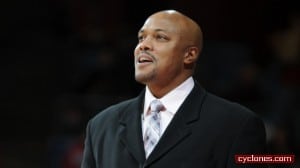
Cornell Mann is an assistant men’s basketball coach at Iowa State University and is in his second year there. Before that, he was at Dayton University for 3 years, where he helped the Flyers to achieve 3 straight post-season bids. Coach Mann is an experienced division 1 assistant coach and has been around the game for a long time. These are the basketball coaching clinic notes that were taken from when he spoke at the 2010 Rising Coaches Conference.
I do the best I can to be real at all times.
Support staff jobs are important; always remember that!
- Work hard at everything you do.
Meeting new people is essential.
- Hand-write letters to people all the time.
DO A GREAT JOB AT THE JOB YOU ARE AT.
The people you work with are the people you need to impress.
- Never let an opportunity pass you by.
- Wear slacks to the office on an off-day.
- Know your co-worker’s contacts.
- Your coaches are your promoters… Earn their respect!
Best way to advance: show passion and attack each assignment/task with passion.
- Have an attention to detail and consistent with terminology.
- Have a niche!
- Re-create your position on your staff.
- Ask your coaches for projects and be creative.
- Create projects for your staff.
- Continue to be impressive to everyone.
Learn how, not who.
- Learn how to do things from people, but don’t be them- be yourself and be real.
- Be you and learn how you can be successful.
Hold true to your core values.
- Don’t ever compare yourself to the success of others.
BE LOYAL!
Earl Grant Rising Coaches Basketball Coaching Clinic Notes
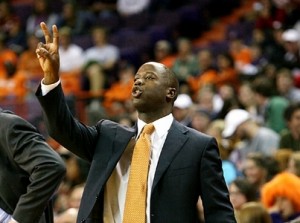
Earl Grant is an assistant men’s basketball coach at Clemson University, and he has been there since 2010. Before that, he coached with Greg Marshall at Wichita State. He is a great college basketball recruiter and has been fortunate to learn from one of the best college basketball coaches in the game today. These basketball coaching clinic notes were taken from the Rising Coaches Conference in 2010.
You never know who is watching you & paying attention.
- How do you treat people?
- Your presentation is essential/crucial.
- This is a profession; we are professionals.
We need to learn how to grind.
- You are going to get told “no” a lot, get used to hearing it, but never settle for it.
Keys to getting jobs: meet with your assistants and bust your butt for them.
- They are always watching you!
- Work for people who let you grow as a person and coach.
Look for loyal people, good people, and hard workers to associate yourself with. This is a “people’s business”- network!
Learned from Greg Marshall:
- hold people accountable for little things.
- Coach Marshall insisted that his assistants blow the whistle and coach in practice.
- Have an acute attention to detail.
How can you make the next jump?
- You will be surprised with who is watching you.
- More people can hurt you than can help you.
- The best way to move up is to get your Head Coach (HC) an extension by winning.
- Work hard and don’t spend time looking for jobs; just work hard!
Connect the dots with recruits
- Who deals with that recruit the most.
- Get to know everyone associated with the recruit.
- Put a fence around a kid and know who surrounds him.
- Get information and USE that information.
- Start early on kids because it takes time.
- Initiate conversations with your relationships.
When recruiting at AAU tournaments, watch the games. There is a time (night) to socialize with your peers.
Why Basketball Coaching Clinic Notes
Basketball coaching clinic notes are essential documents for any basketball coach or aspiring coach. These notes serve as a valuable resource for gathering knowledge, strategies, and tactics to improve one’s coaching skills. Attending a coaching clinic can be an overwhelming experience with so much information being presented in a short amount of time.
Having detailed notes to refer back to is crucial in retaining and implementing the information learned. Additionally, these notes can also serve as a reference for future coaching decisions and game planning.
Key Takeaways from Basketball Coaching Clinic Notes
Every basketball coaching clinic will have its own unique set of topics and speakers, but there are some key takeaways that can be found in most clinic notes. These include:
- Fundamentals of the Game: Most clinics will cover fundamental skills such as shooting, passing, ball-handling, and defense. These are the building blocks of any successful basketball team and it’s important for coaches to continuously reinforce these fundamentals in their players.
- Offensive Strategies: Clinics will often delve into different offensive strategies such as motion offense, set plays, and transition offense. Coaches can learn new tactics to improve their team’s scoring efficiency and create a more dynamic offense.
- Defensive Strategies: Just as important as offense, defensive strategies are also heavily discussed in coaching clinics. Coaches can learn different techniques for man-to-man defense, zone defense, and pressing defense.
- Player Development: Clinics may also cover topics related to player development such as individual skill drills, team practice drills, and player psychology. These tips can help coaches better understand how to motivate and develop their players.
- Game Management: Coaching clinics often provide insight on game management strategies, such as in-game adjustments, time management, and implementing effective substitutions. These are crucial aspects of coaching that can greatly impact the outcome of a game.
Benefits of Attending Basketball Coaching Clinics
Attending basketball coaching clinics provides numerous benefits, including:
- Networking opportunities: Clinics allow coaches to connect with other coaches and build relationships within the basketball community.
- Exposure to new ideas: Coaches can learn different perspectives and strategies from experienced speakers and fellow coaches.
- Professional development: Attending clinics can be used as a form of professional development for coaches looking to improve their skills and advance in their coaching careers.
- Staying current: The game of basketball is constantly evolving, and attending clinics ensures that coaches stay up-to-date with the latest trends and strategies.
Basketball Coaching Clinic Notes Frequently Asked Questions (FAQs)
Here are some frequently asked questions about basketball coaching clinic notes and the answers to those questions.
How do I take effective notes during a coaching clinic?
- Bring the necessary materials such as a notebook, pen, and highlighter.
- Write down key points and main ideas instead of trying to transcribe everything.
- Use shorthand or abbreviations for quicker note-taking.
- Organize your notes by creating headings and subheadings.
What should I do with my coaching clinic notes after the clinic is over?
- Review your notes and highlight important information.
- Refer back to your notes when planning practices or making coaching decisions.
- Share your notes with other coaches who were unable to attend the clinic.
Basketball Coaching Clinic Videos
Lewis Preston Basketball Clinic Video
This basketball clinic video will feature Lewis Preston, the head men’s basketball coach at Kennesaw State University. Coach Preston is in his third season (13-14) with the owls and is in the process of developing a quality basketball program. Before receiving the head coaching job at KSU, he was an assistant coach at Penn State (3 years), Florida (2 years), and Notre Dame (6 years). Along with coaching basketball, Preston has played professionally over in Europe as well.
Having played the post position at a high level, coach Preston has a unique learning experience that not many other coaches have when coaching post play. This Lewis Preston basketball clinic video is going to cover developing your post players the right way. It will give you some great teaching points for your bigs and some great drills that you can use to help develop the different needed skills to play the position.
After finishing this video, make sure that you head over to our basketball post move drills section to see some great drills on finishing in the post and around the basket.
Stan Jones Basketball Clinic Video

Stan Jones is the Associate Head Coach at Florida State University, and he has been there since 2002. Coach Jones has been one of the key factors in helping the Seminoles turn around their basketball program and make noise on the national scene each year. In 2012 he helped the basketball team win their first ACC championship in school history and has also been a part of several NCAA tournament runs. He has also been apart of college basketball programs like Miami and Mississippi State as well. At both of these programs, he helped the teams achieve success.
This Stan Jones basketball clinic video will cover guard development and some excellent basketball drills to use in your practices and basketball training. The video will go over some ball-handling drills, shooting drills, scoring moves, and several other essential guard actions. Coach Jones has a wealth of knowledge on skill development and has worked with and trained multiple high-level basketball players. Use his knowledge to help you become the best basketball coach that you can be, and then check out the rest of our free basketball coaching clinic notes.
Steve Forbes: Getting the Most Out of Your Basketball Practices
Steve Forbes is the head men’s basketball coach at Northwest Florida State (NJCAA), and in his first two years as the head coach, he has gone an incredible 57-4. Before that, Steve was an assistant coach under Bruce Pearl at Tennessee University. Coach Forbes is known nationally as one of the best recruiters in college basketball. He has a knack for recruiting talented players and then getting that player’s best.
This basketball coaching clinic video is from the 2012 Basketball HQ coaching clinic and will cover getting the most out of your practice. There are only so many hours and minutes that you get each week to prepare your team to win games and hopefully have a chance to win a championship.
That is why you must learn how to maximize the time that you have with your team. You don’t have time to waste, and the coaches that really realize that can put themselves out ahead of the pack. Watch this video and see what coach Forbes has to say about taking full advantage of your practice time.
Mike Jarvis on 40 Years in the Game of Basketball
Mike Jarvis is the head men’s basketball coach at Florida Atlantic University. Before joining the owls, coach Jarvis coached on several different teams with some excellent basketball coaches. Some of those coaches include Red Auerbach, Jim Calhoun, and Tom Sanders. All of these legendary coaches helped him learn, grow, and form his basketball coaching philosophy. Along with learning under some really great coaches, he was also able to coach some really talented players, the most notable being Patrick Ewing.
Coach Jarvis has been a head coach at four different schools, Boston University, George Washington University, St. John’s University, and Florida Atlantic University (current location). These coaching jobs have helped Mike grow as a coach and learn more about the game of basketball. He is still learning, growing, and developing his basketball knowledge, just as any good coach should do.
Here is the basketball coaching clinic video from when he spoke at the Basketball HQ Clinic in 2012. Coach Jarvis talked about some of his life and 40 plus years of basketball coaching experiences and also covered some of his personal basketball coaching philosophy. Any coach that has been around the game of basketball as long as Mike Jarvis is worth a listen when they speak.
Basketball Coaching Clinic Notes Conclusion
Attending basketball coaching clinics and taking thorough notes can greatly benefit coaches at any level. These notes serve as a valuable resource for learning new skills, strategies, and techniques in coaching basketball.
Coaches should continuously review and refer back to their notes to improve their coaching abilities and stay current with the latest trends in the game. So, attending a coaching clinic may provide you with all the necessary knowledge, but jotting down notes will help you to revise.
The more detailed and organized your notes are, the more effective they will be in helping you become a better coach. As the famous saying goes, “A good coach is always learning.”
Attending coaching clinics and taking thorough notes is just one of the many ways coaches can continue to learn and improve their coaching skills. So, always be ready to learn and take advantage of any opportunity to attend a basketball coaching clinic.

